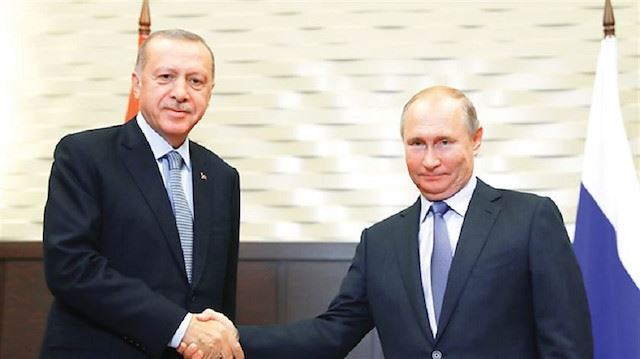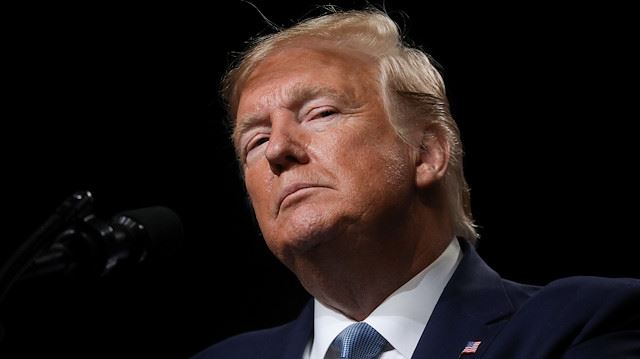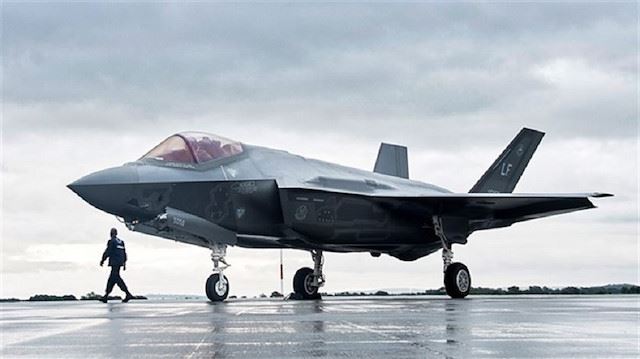Turkish security forces have destroyed 40 mines and 227 improvised explosives in its anti-terror operation in northern Syria, the country’s Nati
Turkish security forces have destroyed 40 mines and 227 improvised explosives in its anti-terror operation in northern Syria, the country’s National Defense Ministry said on Thursday.
The ministry is also working with the Russian officials on mechanisms for the implementation of the Sochi agreement, Lt. Cmdr. Nadide Sebnem Aktop, ministry spokeswoman, told reporters in capital Ankara.
“Loaves of bread prepared in the oven set up by the Turkish Armed Forces in Tal Abyad, were distributed among local people in the region and health support were also provided to them at the first aid station,” Aktop said.
On Oct. 9, Turkey launched Operation Peace Spring to eliminate terrorists from northern Syria east of the Euphrates River in order to secure Turkey’s borders, aid in the safe return of Syrian refugees, and ensure Syria’s territorial integrity.
On Tuesday, Turkish President Recep Tayyip Erdogan and his Russian counterpart Vladimir Putin held a meeting in Russia’s Black Sea resort town of Sochi.
Ankara and Moscow reached a deal under which YPG/PKK terrorists will pull back 30 kilometers (18.6 miles) south of Turkey’s border with northern Syria within 150 hours and security forces from Turkey and Russia will conduct joint patrols there.
In its more than 30-year terror campaign against Turkey, the PKK — listed as a terrorist organization by Turkey, the U.S. and the European Union — has been responsible for deaths of 40,000 people, including women, children and infants. The YPG is the Syrian offshoot of the PKK.
Turkey, US to overcome F-35 problem: DefMin
Turkey expects that disagreements with the United States over production of F-35 jets will be overcome, its defence minister told Reuters, adding that Ankara remained at the centre of NATO despite criticism from allies of its operation in northern Syria.Washington began removing Ankara from a joint F-35 production programme after Turkey bought and took delivery in July of Russian S-400 missile defence systems.The United States says the system is not compatible with North Atlantic Treaty Organization defences, and pose a threat to Lockheed Martin Corp’s F-35 stealth fighters.Turkey, which also wanted to buy the jets, has since said it could look elsewhere.”We hope that we will continue producing them. There are some issues right now, but I believe these issues will be overcome,” Defence Minister Hulusi Akar said in an interview on Wednesday.”We are partners in the production of F-35s, and we have been investing in the project for years, around $1.5 billion… producing some of its parts in Turkey,” he added.Donald Trump imposed sanctions Oct. 14 on Turkey’s Defense, and Energy and Natural Resources ministries, as well as Turkish Defense Minister Hulusi Akar, Interior Minister Suleyman Soylu and Minister of Energy and Natural Resources Fatih Donmez.Trump ordered sanctions on two Turkish ministries and three Turkish ministers be lifted Wednesday following what he said was Turkey’s vow to halt its operation in northeast Syria.Akar rejected criticism that Turkey was drifting away from its Western allies.”We are at the centre of NATO, and we remain determined to carry out all of our responsibilities fully. We are going nowhere,” he said.Akar added that Turkey had caught around 200 Daesh terrorists in northern Syria during its operations into the area.”In various ways, we have captured 200 Daesh members,” he said. “We are preserving them in the appropriate ways in the appropriate places.”

Turkey agrees with Russia, US on Syria, border security
Turkey has struck two major deals with Russia and the U.S. for a long-planned safe zone in northern Syria, a critical development which is expected to change the dynamics of the Syrian crisis in favor of millions of displaced Syrian refugees.Both Russia and the U.S. reaffirmed Turkey’s legitimate security concern and its fight against terrorist organizations.The tension on Turkey-Syria border reached a peak on Tuesday night when Turkey’s 120-hour pause of its anti-terror operation in northern Syria, which is one of the most important clauses of agreement with the U.S., expired.On Oct. 17, a U.S. delegation led by Vice President Mike Pence paid a working visit to the Turkish capital, Ankara, where they met with President Recep Tayyip Erdogan and discussed Turkey’s anti-terror operation.Following the meeting, the two sides reached a 13-point agreement on northeastern Syria. As part of the deal, Turkey paused its anti-terror push east of the Euphrates for 120 hours to allow the withdrawal of the terrorist PKK and its Syrian offshoot the YPG/PKK from the planned safe zone. The pause ended on Tuesday night.Just hours before the pause was set to expire, Turkey reached another “historic” deal with Moscow to enlarge the safe zone. Erdogan and his counterpart Vladimir Putin met in the Russian coastal city of Sochi to discuss Turkey’s Operation Peace Spring, which was launched on Oct. 9, to eliminate terrorists from northern Syria in order to secure Turkey’s borders, aid in the safe return of Syrian refugees and ensure Syria’s territorial integrity.Ankara and Moscow reached a 10-point deal under which YPG/PKK terrorists would pull back 30 kilometers (18.6 miles) south of Turkey’s border within 150 hours and security forces from Turkey and Russia would start to conduct joint patrols.The 150-hour period, during which the Russian military police and the Syrian border guards will enter the Syrian side of the border outside the area of Operation Peace Spring to facilitate the removal of YPG/PKK terrorists and their weapons to a location 30 km (18.6 miles) from Turkey’s border in northern Syria, started at 12 noon (0900GMT).Similarities between Turkey’s deal with US and RussiaBoth Russia and the U.S. reaffirmed Turkey’s legitimate security concerns and its fight against terrorist organizations.They also agreed on ensuring the political unity and territorial integrity of Syria.Both sides referred to the YPG/PKK terrorist organization and its weapons in the region”All YPG elements and their weapons will be removed from Manbij and Tal Rifat,” the agreement with Russia said.Similarly, Turkey and the U.S. highlighted the importance of a safe zone “to include the re-collection of YPG heavy weapons and the disablement of their fortifications and all other fighting positions”.Russia and Turkey also agreed that the status quo in the current Operation Peace Spring area covering Tel Abyad and Ras al-Ayn with a depth of 32 km (20 miles) will be preserved.Turkey and the U.S. earlier agreed on Turkey having 32 km (20 miles) of safe zone south of the Turkish border in Syria.Both Russia and the U.S. emphasized their determination to combat terrorism in all forms and that the manifestations and counter-terrorism operations must target only terrorists and their equipment.Regarding the humanitarian aspect of the issue and refugees in particular, both countries pledged to abide by human rights.The U.S. highlighted its “pledge to uphold human life, human rights, and the protection of religious and ethnic communities”.Similarly, Russia called on the international community to “provide humanitarian assistance to all returning Syrians without discrimination, politicization and preconditions”.Both countries made a commitment to implement all the goals stated in the agreements.Difference aspects of the dealsStressing the importance of the Adana agreement, Russia will facilitate the implementation of the Adana Agreement in the current circumstances.Turkey said its fight against terrorism in Syria is based on the Adana Agreement signed between the two countries in 1998, which allows Turkish forces to conduct military operations in Syrian territory.Regarding the Daesh detainees in the region, both Turkey and the U.S. will coordinate on detention facilities and internally displaced persons from formerly Daesh-controlled areas, as appropriate.Daesh elements were not a part of Turkey’s deal with Russia.Turkey will take over the custody of Daesh elements and their family members being held in detention facilities and camps in areas to be freed from terror by Operation Peace Spring, according to the Turkish Foreign Ministry on Oct. 12.Operation Peace SpringAs part of Operation Peace Spring, 160 settlements and 2,200 square kilometers (849 square miles) area has been taken under control and 775 terrorists have been neutralized, according to the Turkish Foreign Ministry.Turkish authorities often use the word “neutralized” to imply the terrorists in question surrendered or were killed or captured.In its more than 30-year terror campaign against Turkey, the PKK — listed as a terrorist organization by Turkey, the U.S. and the European Union — has been responsible for deaths of 40,000 people, including women, children and infants.At least seven Turkish soldiers and 93 Syrian National Army (SNA) soldiers have been martyred and 357 SNA soldiers were injured since Turkey launched Operation Peace Spring.Despite the deal with the U.S., YPG/PKK terrorists shot 42 harassing fires in northern Syria, according to the Turkish Defense Ministry.So far 136 vehicles have left the region and a total of 40 mines and 222 handmade explosives have been defused.On Oct. 7, U.S. President Donald Trump announced that it would pull back its forces from the Syrian border after a telephone call with Erdogan.Frustrated over the U.S. withdrawal, some YPG/PKK supporters protested the U.S. troops by throwing rotten vegetables.

Trump lifts Turkey sanctions placed over Syria op
U.S. President Donald Trump ordered sanctions on two Turkish ministries and three Turkish ministers be lifted Wednesday following what he said was Turkey’s vow to halt fighting in northeast Syria.Trump said the Turkish government informed his administration earlier Wednesday morning “that they would be stopping combat and their offensive in Syria, and making the cease-fire permanent.””However, you would define the word ‘permanent’ in that part of the world as somewhat questionable,” Trump said in the White House’s Diplomatic Reception Room. “The sanctions will be lifted unless something happens that we’re not happy with. This was an outcome that was created by us, the United States.”On Oct. 9, Turkey launched Operation Peace Spring to eliminate terrorists from northern Syria east of the Euphrates River to secure Turkey’s borders, aid in the safe return of Syrian refugees and ensure Syria’s territorial integrity.Ankara agreed with Washington on Oct. 17 to pause its operation to allow YPG/PKK terrorists to withdraw from the planned safe zone.Turkish President Recep Tayyip Erdogan and his Russian counterpart Vladimir Putin held a “historic” meeting Tuesday in the Black Sea resort town of Sochi just hours before the pause was set to expire.Ankara and Moscow reached a deal under which PKK/YPG terrorists will pull back 30 kilometers (19 miles) south of Turkey’s border with northern Syria within 150 hours and security forces from Turkey and Russia will conduct joint patrols there.In its more than 30-year terror campaign against Turkey, the PKK — listed as a terrorist organization by Turkey, the U.S. and the European Union — has been responsible for deaths of 40,000 people, including women, children and infants. The YPG is the Syrian offshoot of the PKK.
